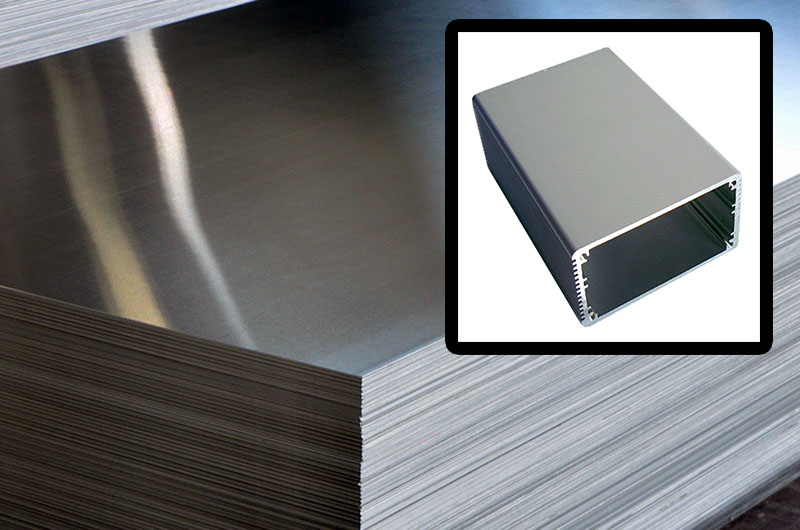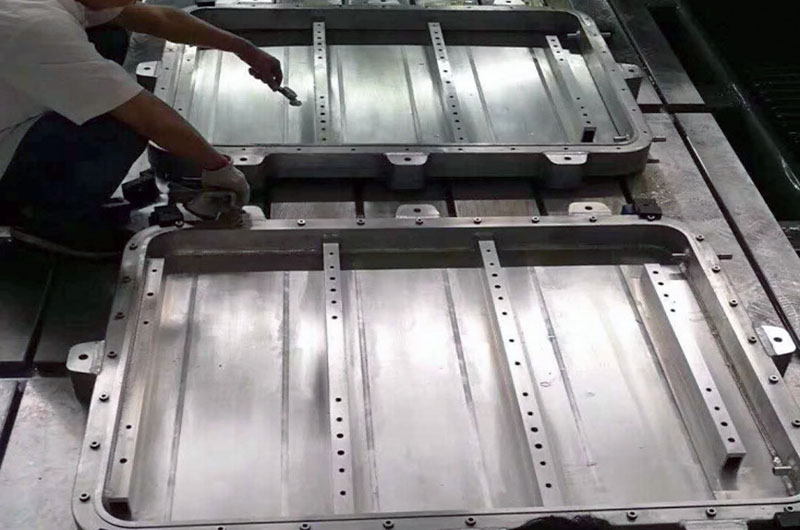Aluminum plate for power battery casing is a special type of aluminum plate used to manufacture battery casings for various types of power batteries, including battery casings for electric vehicles (EV), hybrid vehicles and energy storage systems. These aluminum plates are designed to provide structural integrity, thermal management and protection for the internal cells.

Aluminum Sheet Coil for Power Battery Shell Specifications
- Material: Aluminum alloy, usually 1xxx, 3xxx or 5xxx series
- Thickness: Varies based on application, but typically ranges from 0.5mm to 5mm
- Surface treatment: milling, brushing, anodizing or coating on request
- Strength: High strength-to-weight ratio ensures structural integrity
- Corrosion Resistance: Aluminum naturally forms a protective oxide layer that enhances its corrosion resistance
- Conductivity: Aluminum has good thermal conductivity and helps dissipate heat from battery cells
Aluminum alloys such as 1050, 3003, and 3005 are often used in the manufacture of power battery casings due to their excellent properties.
1050 aluminum alloy for Power Battery Shell
Application: 1050 aluminum alloy is a commercially pure aluminum alloy with high electrical conductivity. It is commonly used in applications where conductivity is critical, such as electrical conductors and power transmission lines. In terms of power battery casing, 1050 alloy can be used for parts that require good electrical conductivity.
Characteristics: high conductivity, excellent formability, corrosion resistance, weldability.
3003 aluminum alloy for Power Battery Shell
Application: 3003 aluminum alloy is a widely used alloy known for its excellent formability, corrosion resistance and moderate strength. It has applications in various industries, including automotive, construction and electronics. In power battery casings, 3003 alloy can be used for parts requiring good formability and corrosion resistance.
Performance: good formability, corrosion resistance, medium strength, weldability, heat dissipation.
3005 aluminum alloy for Power Battery Shell
Application: 3005 aluminum alloy is a non-heat treatable alloy known for its excellent corrosion resistance and weldability. It is commonly used in applications where corrosion resistance is critical, such as marine environments, chemical storage tanks and building exteriors. In terms of power battery casing, 3005 alloy can be used for parts exposed to harsh environments or corrosive substances.
Properties: Excellent corrosion resistance, weldability, moderate strength and formability.

| Alloy | 1050 | 3003 | 3005 | ||||
| Temper | O H12 H14 | O H12 H14 | O | ||||
| Size specification/mm | Thickness | 0.60-1.60 | 0.60-3.00 | 0.60-2.00 | |||
| Type | plate | strip | plate | strip | plate | strip | |
| Width | 100.0-2000.0 | 100.0-2000.0 | 100.0-2000.0 | ||||
| length | 1000-3 000 | - | 1000-3 000 | - | 1000-3 000 | - | |
| Application | power battery shells | ||||||
Aluminum Sheet Coil for Power Battery Shell Advantages
- Lightweight: Compared to other metals such as steel, aluminum is lightweight, reducing overall vehicle weight and improving energy efficiency.
- Strength: Although aluminum is lightweight, it provides sufficient structural strength to protect the battery.
- Corrosion Resistance: Aluminum’s natural oxide layer provides excellent corrosion resistance, extending the life of the battery casing.
- Thermal Conductivity: Aluminum’s high thermal conductivity helps dissipate the heat generated during battery operation, which is critical to maintaining optimal operating temperatures and extending battery life.
- Recyclability: Aluminum is highly recyclable, making it an environmentally friendly choice for battery housings.
Chemical composition of aluminum plate for power battery shells
| Alloy | 1050 | 3003 | 3005 |
| Si | 0.25 | 0.60 | 0.60 |
| Fe | 0.40 | 0.70 | 0.70 |
| Cu | 0.05 | 0.05-0.20 | 0.30 |
| Mn | 0.05 | 1.0-1.5 | 1.0-1.5 |
| Mg | 0.05 | - | 0.2-0.6 |
| Cr | - | - | 0.10 |
| Ni | - | - | - |
| Zn | 0.05 | 0.10 | 0.25 |
| Ti | 0.03 | - | 0.10 |
| Al | Remainder | ||
Mechanical properties of aluminum plates for power battery shells
| Alloy | Temper | Thickness/mm | Tensile strength /MPa | Specified non-proportional tensile strength /MPa | Elongation after break /% |
| 1050 | O | 0.60-1.50 | 60-90 | ≥20 | ≥30 |
| >1.50-1.60 | ≥35 | ||||
| H12 | 0.60-1.50 | 80-110 | ≥65 | ≥6 | |
| >1.50-1.60 | ≥8 | ||||
| H14 | 0.60-1.50 | 95-120 | 75 | ≥4 | |
| >1.50-1.60 | ≥5 | ||||
| 3003 | 0.60-1.50 | 100-130 | ≥40 | ≥25 | |
| >1.50-3.00 | ≥30 | ||||
| H12 | 0.60-1.50 | 125-155 | ≥90 | ≥5 | |
| >1.50-3.00 | ≥7 | ||||
| H14 | 0.60-1.50 | 140-175 | ≥125 | ≥4 | |
| >1.50-3.00 | 6 | ||||
| H118 | 1.00-1.50 | ≥185 | ≥165 | ≥2 | |
| >1.50-4.00 | ≥3 | ||||
| 3005 | O | 0.60-1.50 | 115-165 | ≥45 | ≥18 |
| >1.50-2.00 | ≥20 |
Deviation requirements for aluminum plates used for power battery shells
| Thickness/mm | Allowable deviation/mm |
| 0.60-2.00 | ±0.02 |
| >2.00-3.00 | ±0.03 |
| >3.00-4.00 | ±0.04 |
| Width/mm | Allowable deviation/mm |
| 500.0 | ±0.5 |
| >500.0-2000.0 | ±1.5 |
Aluminum Sheet Coil for Power Battery Shell Applications
- Electric Vehicles (EV): Aluminum battery casings are widely used in electric vehicles to house lithium-ion batteries, provide structural support and thermal management.
- Hybrid vehicles: Similar to electric vehicles, hybrid vehicles also use aluminum battery casings as their energy storage systems.
- Energy Storage Systems (ESS): Aluminum battery enclosures are used in stationary energy storage systems, such as those used for grid stabilization and renewable energy integration.
- Consumer Electronics: Some consumer electronics, especially high-end devices with advanced battery systems, may use aluminum battery casings to improve performance and durability.
How to choose Aluminum Sheet Coil for Power Battery Shell
Performance requirements: Consider the specific performance requirements of the power battery housing components. For example, if conductivity is critical, alloy 1050 may be preferred. If corrosion resistance is a primary concern, 3005 alloy may be a better choice.
- Formability: Evaluate the formability requirements of the part. If complex shapes or deep drawing are required, an alloy with good formability such as 3003 or 3005 will be suitable.
- Cost: Compare the cost of different alloys. While 1050 alloy may have excellent electrical conductivity, it may be more expensive than 3003 or 3005 alloys, which provide a balance of performance at potentially lower cost.
- Environment: Consider the usage environment of the power battery. If exposed to corrosive substances or harsh conditions, preference is given to alloys with excellent corrosion resistance, such as 3005.
- Manufacturing Process: Consult with the material supplier or manufacturer to determine which alloy is best suited for the specific manufacturing process used to produce the power battery casing.
Ultimately, the choice of aluminum alloy for power battery casing depends on careful consideration of performance requirements, cost constraints and environmental factors. It is often beneficial to consult with a materials engineer or supplier to make an informed decision.
Overall, aluminum plates for power battery casings play a vital role in ensuring the safety, performance and longevity of modern battery systems in a variety of applications.

